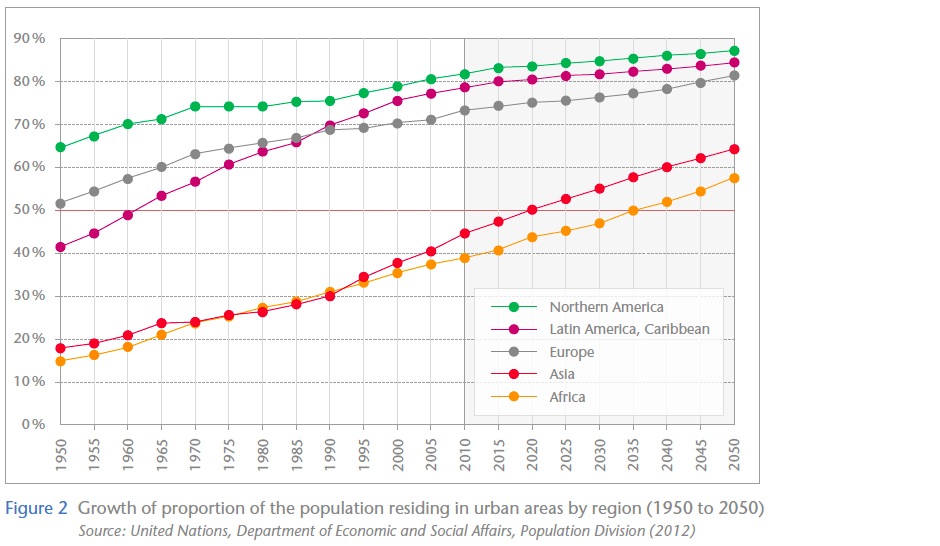WORLD BUSINESS COUNCIL FOR SUSTAINABLE DEVELOPMENT
Today, more than half of the planet’s inhabitants are living in urban areas. By 2050, more than 70 % of the global population will live in cities. The scale and pace of urbanization in the coming decades is unprecedented in human history.
The battle for sustainable development will therefore be won and lost in cities. Cities already consume up to 80 % of global material and energy supplies and produce around 75 % of carbon emissions. With current energy- and resource-intensive modes of urban development, the addition of 3 billion more city-dwellers by 2050 is likely to significantly exceed the ecological carrying capacity of the planet.
Furthermore, the concentration of people, resources and infrastructure in cities is making societies more vulnerable to disasters and the adverse impacts of climate change, such as sea-level rise and storm events. Cities are therefore likely to bear a major share of the burden of the costs and risks associated with climate change adaptation, as well as the responsibility of establishing much more resilient infrastructure.
The particularly rapid urbanization being experienced in many developing countries often overwhelms cities, which struggle to develop adequate infrastructure, resulting in significant negative effects on local communities and the environment. Haphazard urban growth sees poorer sections of the population with little choice but to live in informal settlements or slums, which often provide very limited access to basic social services and livelihood opportunities.
New urban development (and the renewal of existing urban areas) needs to be focused on achieving much higher levels of energy and resource efficiency if cities are to remain within the ecological carrying capacity of the local and global environment, while also ensuring universal access to essential services (e.g., healthcare, water and sanitation, energy) for all city dwellers.
BOX 1 highlights the scale of urban growth in India and China and the enormous investments needed to provide supporting infrastructure. These examples underscore the urgent need to establish sustainable urban development models – once cities and their infrastructure are laid out, it is very costly and very difficult to change them (the “lock-in” effect).
CITIES AS SUSTAINABLE LEADERS
While cities face many challenges, they are also leading the global transformation towards inclusive green economies and sustainable development. They will generate the majority of national gross domestic product (GDP), and are the primary centers of technological and social innovation. Compact cities with mixed-use urban form are more resource-efficient than any other human settlement pattern for a given level of economic output. Integrated design strategies and technologies are available to improve urban transport, the construction of buildings, and the development of urban energy, water and waste systems in such a way that they significantly reduce resource and energy consumption while avoiding lock-in effects.
Furthermore, if cities are planned and managed effectively, they can help ensure universal access to services and employment and thus play a critical role in reducing poverty and social exclusion. Cities will also be at the forefront of the creation of “green jobs,”6 with many of the major opportunities for the greening of the labor market associated with the urban economy.
These challenges and opportunities have placed cities at the center of the sustainability agenda and many city leaders and municipal authorities are taking action. Around the world, cities are establishing ambitious visions and targets to drive transformational action – as evidenced by the cities presented in this report. The sustainability agendas vary from city to city but often include these key elements:
- Climate change mitigation. Cities have set ambitious objectives for the reduction of greenhouse gas emissions, some going as far as committing to becoming “climate neutral.” These objectives are often pursued through comprehensive programs focused on priority sectors / issues, such as building and industrial energy efficiency, renewable energy production, public transportation, low-carbon mobility and water / wastewater management.
- Disaster and climate resilience. Cities are taking the lead in developing strategies to ensure resilience to disasters and adaptation to the effects of climate change, often through fundamental changes in urban planning, infrastructure design and city management.
- Livability and social inclusion. Promoting the well-being and quality of life of citizens and ensuring inclusiveness for the poor and marginalized sections of society is fundamental to urban sustainability. Cities are addressing these complex challenges through multifaceted strategies focusing on equitable social development, universal access to services and improvement of local environmental quality.
- Green economic development. Cities are pursuing transformational economic development strategies based on growing green industries and technology clusters and the promotion of green jobs.
- Smart technologies. Cities are actively adopting or promoting new technologies that are frequently enabled by the enhanced connectivity of new information and communication technologies (ICT). They enable fundamental improvements in the operation and management of key infrastructure within the city to improve quality, efficiency and environmental performance, as well as providing new or better services.
Action at the city level is being complemented and stimulated by cooperation and knowledge sharing at the national, regional and international levels. Organizations such as ICLEI – Local Governments for Sustainability and the C40 Cities Climate Leadership Group actively promote best practice sharing between cities and provide advocacy platforms to ensure urban sustainability is given appropriate consideration in national and international policy agendas.
Download full version (wbcsd.org): Urban Infrastructure Initiative Final Report
About the World Business Council for Sustainable Development
www.wbcsd.org
The WBCSD is a CEO – led, global coalition of some 200 companies advocating for progress on sustainable development. It aims to be a catalyst for innovation and sustainable growth in a world where resources are increasingly limited.
Tags: PA, Philadelphia, The Urban Infrastructure Initiative, UII, WBCSD, World Business Council for Sustainable Development







 RSS Feed
RSS Feed